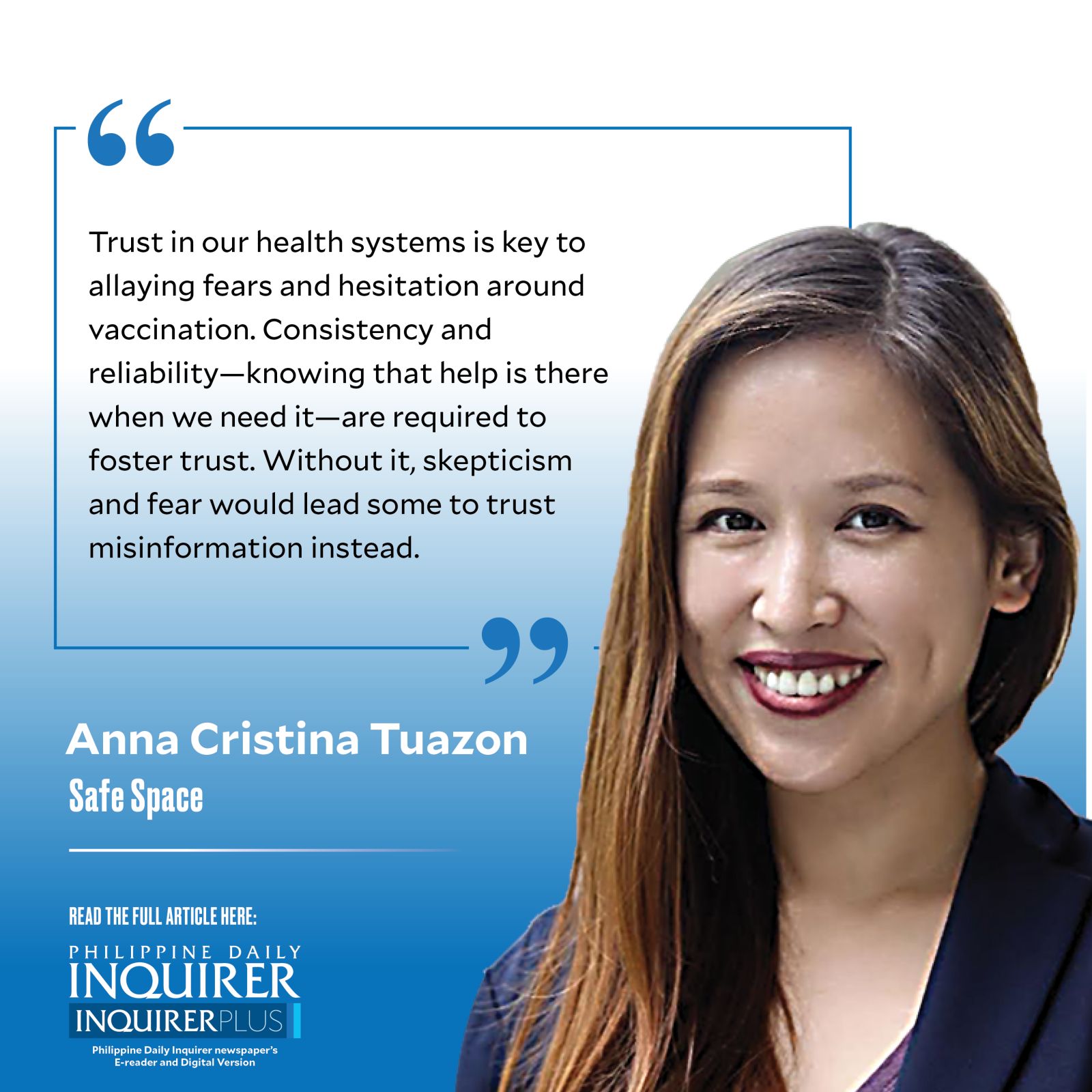Why vaccine-preventable diseases are back

The last time I had heard “whooping cough” uttered was as a story arc in a historical novel. Now we hear daily updates regarding the current outbreak of whooping cough or pertussis. As of this writing, 862 cases were reported, mostly children under the age of 5, and 49 have died. At least 66 percent of the diagnosed children were either unvaccinated or did not know their vaccination history. Four local government units have declared a pertussis outbreak: Quezon City, Pasig City, Cavite province, and Iloilo City. Measles have also reemerged, with the entire Bangsamoro Autonomous Region in Muslim Mindanao declaring an outbreak.
Our recent saga with the COVID-19 pandemic most likely contributed to the reemergence of what should have been preventable diseases, with immunizations screeching to a halt during the height of quarantine restrictions. The Department of Health National Immunization Program reported that only 72 percent of over two million children aged 1 year and younger are fully immunized, far from the needed 90 percent coverage to gain herd immunity against these diseases.
The pandemic, however, is over. And routine immunization for children, including the pentavalent vaccine that covers pertussis, is available for free in our barangay health centers. So how come parents have not resumed taking their children for their vaccinations? For some, it may simply be a matter of forgetting, as we developed the habit of foregoing nonurgent needs during the pandemic. For others, it is an intentional choice to not vaccinate their children, for fear of it causing negative side effects.
Fear is a tricky thing. Combine it with a habit of avoidance and you have something that is very difficult to remove. There is so much misinformation surrounding vaccines that are designed to sow fear. And once we wrap (mis)information in fear, this becomes a potent and dangerous belief that is not amenable to change, even with disconfirming evidence. Even when given correct knowledge, the fear does not dissipate immediately as we only replace the facts, not the emotions. For fear to be removed correctly, we need to emotionally experience vaccines differently. However, this is difficult to do as absence of illness or disease does not cause an equivalent intensity of relief as compared to the intensity of acute fear. Think about how we feel about seat belts—we don’t really appreciate them until we get into a car accident, and it saves our lives. Every day that we don’t get into an accident, however, we grow doubtful about their necessity until we stop using them. We only remember the car accidents we had and not the car accidents we prevented.
The benefits of vaccines are even harder to experience directly. How many times have I had someone tell me how the COVID-19 vaccines do not work because they contracted it anyway. Or worse, how they doubt the seriousness of the virus because it only felt like a “regular cold” (thanks to the vaccine!). After three years of the pandemic and multiple rounds of COVID-19 vaccination, I finally contracted it during the third trimester of my pregnancy, though the symptoms lasted only a few days and my baby was not harmed. I was mindful enough to appreciate that, as a vulnerable person, it could have been more dangerous if I weren’t vaccinated at all. However, this appreciation is a mental exercise on my part and most people will not realize this in the moment, instead using it as proof of the “uselessness” of vaccines.
Perhaps more than just fear, we should consider that some Filipinos have lost trust in vaccines—and in our public health care, in general. Despite those who refused vaccinations, many more Filipinos clamored for the vaccine during the COVID-19 pandemic but were not given access to it. I remember the exasperation I felt when government hadn’t yet widened the categories of those who could avail of the booster shots while they were already expiring in warehouses. We should also remember how much trouble it took to get a vaccine in those early days, when it required us to line up for half a day in the sweltering heat of packed gymnasiums, ironically catching COVID-19 while in line. Missteps and miscalculations in vaccine procurement and distribution had hardened Filipinos to not rely on these vaccines altogether. Even now, there are reports that barangay health centers had been struggling with lack of vaccine supply. If not for the current outbreak of pertussis and measles, would we see their procurement requests facilitated so swiftly?
Trust in our health systems is key to allaying fears and hesitation around vaccination. Consistency and reliability—knowing that help is there when we need it—are required to foster trust. Without it, skepticism and fear would lead some to trust misinformation instead. If we trust our health-care system, we are much more likely to comply and follow public health reminders and mandates.
—————-
aatuazon@up.edu.ph
















